|
|
|
Sort Order |
|
|
|
Items / Page
|
|
|
|
|
|
|
| Srl | Item |
| 1 |
ID:
179226
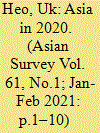

|
|
|
|
|
| Summary/Abstract |
The biggest stories of the year 2020 were the COVID-19 pandemic and a trade dispute between the United States and China. The pandemic significantly damaged the Asian economies. The US-China trade war halted after a phase one trade deal and the pandemic, but the future is unclear.
|
|
|
|
|
|
|
|
|
|
|
|
|
|
|
|
| 2 |
ID:
181718


|
|
|
|
|
| Summary/Abstract |
Too many Western policymakers in the United States and across the European Union still remain attached to an “end of history” worldview, which has somewhat blinded them to the resurgence of great power politics. For the past decade or so, the unipolar world has been breaking apart due to various centrifugal geopolitical trends. The COVID-19 pandemic did not cause these trends, but is accelerating them. A leaderless, multipolar world on the cusp of de-globalization and the onset of a cold war between the United States and the People's Republic of China is a recipe for skyrocketing unpredictability and increased instability. This article traces the origins of these trends and provides a framework to analyze the political trajectories and geopolitical (and ethical) consequences thereof.
|
|
|
|
|
|
|
|
|
|
|
|
|
|
|
|
| 3 |
ID:
185213
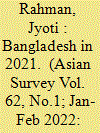

|
|
|
|
|
| Summary/Abstract |
Bangladesh celebrated its 50th year in 2021, marking significant improvement in the lives of its citizens. However, the celebrations were muted by not just the ongoing pandemic but also increasing authoritarianism. The economy was hit hard by the pandemic, but a recovery appears to be underway. A resolution to the Rohingya refugee crisis remains elusive, and in the long run the country remains acutely vulnerable to climate change.
|
|
|
|
|
|
|
|
|
|
|
|
|
|
|
|
| 4 |
ID:
187422
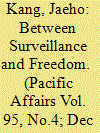

|
|
|
|
|
| Summary/Abstract |
The South Korean response to the COVID-19 pandemic was mainly characterized—whether positively or negatively—as the efficient implementation of surveillance supported by the extensive deployment of information and communication technologies (ICTs). Yet, the fact that the South Korean management of the pandemic was also maintained by citizens’ voluntary participation in stringent quarantine policies has received little critical attention. Through the lens of techno-politics, this essay examines the distinctive interplay of digital monitoring systems and civic engagement in South Korea during the pandemic, with particular reference to data surveillance, horizontal collectivism, and a networked multitude. In capturing the essential features of South Korean pandemic politics as reflecting key components of techno-populism, this essay draws out some social theoretical implications of reconsidering the increasingly close relationship between technology and democracy in the pandemic period.
|
|
|
|
|
|
|
|
|
|
|
|
|
|
|
|
| 5 |
ID:
188272
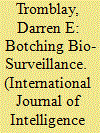

|
|
|
|
|
| Summary/Abstract |
The global COVID-19 pandemic was an intelligence failure, with a death toll orders of magnitude greater than the 11 September 2001 (9/11) attacks on the United States. Multiple factors—of both political and policy natures—contributed to the catastrophe. One area that warrants scrutiny is the United States’ capability for bio-surveillance: identifying the presence of a pathogen before it can take hold within a population. Since 2003, the Department of Homeland Security (DHS) has had a responsibility for one line of defense against biological disasters and yet has stumbled toward implementing that defense, while promising a sense of security that it cannot deliver.
|
|
|
|
|
|
|
|
|
|
|
|
|
|
|
|
| 6 |
ID:
183484
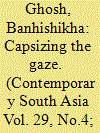

|
|
|
|
|
| Summary/Abstract |
During the current pandemic, gender non-conforming communities (GNCs) in India have been engaging themselves as critical citizens through a demonstration of civic engagement and social responsibility. This paper, based on narratives, documentary evidence and media reports, demonstrates how GNC volunteers are playing a decisive role in accentuating the virtues of representative democracy by serving as ‘monitorial citizens’ in India. It also considers the social dynamics involved in GNC people becoming ‘monitorial’ in a heteronormative society. This means consolidation of their community network and its strategic and instrumental use not just to serve their community, but also a diverse cis-gendered population consisting of migrants, homeless, marginalized, and the poor. In this process, they are creating a shared sense of belonging, based on mutual experiences of discrimination, with other communities that are not categorized as gender non-conforming. Their actions also challenge the normative standards set by mainstream society and create an alternative to existing power hierarchies by capsizing the heteronormative ‘gaze’.
|
|
|
|
|
|
|
|
|
|
|
|
|
|
|
|
| 7 |
ID:
174479


|
|
|
|
|
| Summary/Abstract |
The coronavirus disease COVID-19 has spread at an exponential rate since the World Health Organization declared a global pandemic in March 2020. The United Nations voiced its concerns early about the grave burden that the pandemic placed on people in conflict-affected environments, including its effects on already fragile and vulnerable health care, food security, and other essential services. Recognizing this, UN Secretary-General António Guterres called on March 23 for a global ceasefire to support the response to the pandemic: “To warring parties, I say silence the guns, stop the artillery, end the airstrikes.”
|
|
|
|
|
|
|
|
|
|
|
|
|
|
|
|
| 8 |
ID:
182252
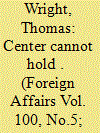

|
|
|
|
|
| Summary/Abstract |
Before the COVID-19 pandemic began, Washington was coalescing
around a new bipartisan consensus: great-power competition,
especially with China, ought to be the main organizing principle
of U.S. foreign policy. For some, the pandemic called that notion into
question by suggesting that transnational threats pose an even greater
danger to the American public than ascendant rival powers. Skeptics of
great-power competition, such as Senator Bernie Sanders, an independent from Vermont, argued that the United States should seek to deescalate tensions with China so that the two countries can work together
to manage borderless risks such as pandemics and climate change.
|
|
|
|
|
|
|
|
|
|
|
|
|
|
|
|
| 9 |
ID:
185007
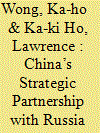

|
|
|
|
|
| Summary/Abstract |
Beijing and Moscow issued a joint statement declaring that Sino-Russian relations have reached the highest level in their history and exceeded the form of a military and political alliance in late June 2021. This article systematically analyzes the Russian-language materials publicized by the authorities and local media in the first six months of the COVID-19 outbreak and explores if the global public health crisis would mean a fundamental transformation of the strategic partnership between China and Russia. The authors find that the Russian government adopted the strictest anti-pandemic measures vis-à-vis China, compared to the other post-Soviet states. Russia took a highly cautious approach to the border control, mobility of Chinese citizens, and procurement of China-made inactivated vaccines. The domestic front in Russia was also inclined to be defensive on China in the time of the pandemic. The findings offer an important reference for the “new era” of Sino-Russian strategic partnership, a highly pragmatic and flexible agreement driven by the mutual interest in prevailing circumstances. It remains to be observed if there will be a fundamental shift in the post-COVID era.
|
|
|
|
|
|
|
|
|
|
|
|
|
|
|
|
| 10 |
ID:
193475
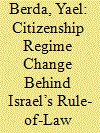

|
|
|
|
|
| Summary/Abstract |
This article delineates the relations between the judicial overhaul launched by Israel’s right-wing government in 2023 and the mechanisms of Israel’s control over Palestinians, demonstrating that they are two parts of a regime change. The essay traces a series of changes in Israel’s citizenship regime the past decade: the enactment of an anti-terrorism law and a nation-state law that defined the exclusive right of Jews to self-determination in Israel; the domestic application of surveillance and control practices developed in the occupied territories; and finally legislation allowing the revocation of Palestinians’ citizenship and the de facto annexation of the occupied territories.
|
|
|
|
|
|
|
|
|
|
|
|
|
|
|
|
| 11 |
ID:
178819


|
|
|
|
|
| Summary/Abstract |
Motivated by the lack of research on price efficiency dynamics of green bonds and the impact of the COVID-19 on the pricing of fixed-income securities, this study investigates the comparative efficiency of green and conventional bond markets pre- and during the COVID-19 pandemic applying asymmetric multifractal analysis. Specifically, the multifractal scaling behaviour is examined separately during upward and downward trends in bond markets using the asymmetric multifractal detrended fluctuation analysis (A-MF-DFA) approach. The empirical findings confirm the presence of asymmetric multifractality in the green and traditional bond markets. Not surprisingly, inefficiency in both bond markets significantly escalated during the COVID-19 outbreak. Furthermore, our results indicate a higher level of efficiency of the conventional bond market over the full sample period. However, the green bond market is more efficient during a black swan event, such as the COVID-19 global pandemic, showing the potential of green bonds to become an effective diversifier for investors in traditional assets in times of extreme market turmoil. The results of the study can have important implications for investors and policymakers.
|
|
|
|
|
|
|
|
|
|
|
|
|
|
|
|
| 12 |
ID:
182770
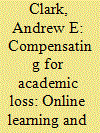

|
|
|
|
|
| Summary/Abstract |
The COVID-19 pandemic has led to widespread school shutdowns, with many continuing distance education via online-learning platforms. We here estimate the causal effects of online education on student exam performance using administrative data from Chinese Middle Schools. Taking a difference-in-differences approach, we find that receiving online education during the COVID-19 lockdown improved student academic results by 0.22 of a standard deviation, relative to pupils without learning support from their school. Not all online education was equal: students who were given recorded online lessons from external higher-quality teachers had higher exam scores than those whose lessons were recorded by teachers from their own school. The educational benefits of distance learning were the same for rural and urban students, but the exam performance of students who used a computer for online education was better than those who used a smartphone. Last, while everyone except the very-best students performed better with online learning, it was low achievers who benefited from teacher quality.
|
|
|
|
|
|
|
|
|
|
|
|
|
|
|
|
| 13 |
ID:
178321
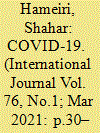

|
|
|
|
|
| Summary/Abstract |
Lockdowns and border closures to manage the ongoing COVID-19 pandemic have caused the greatest global economic shock since the Great Depression. Does this also signal the end of economic globalization, the most significant trend of the past forty years? And if so, what kind of global political economy is emerging from the wreckage? In this article, I argue that COVID-19 is mainly intensifying pre-existing trends, set in motion by the global financial crisis of 2008 and the People’s Republic of China (PRC)’s economic rise. The disruptions to global supply chains wrought by COVID-19 have combined with rising United States–PRC rivalry, growing disaffection with the distributional impacts of global value chains, and automation to catalyze the turn away from globalized production. Meanwhile, amid the economic doom and gloom, financial markets are booming, high on the central banks’ liquidity injections to which they have been addicted since the 2008 crisis. As in the decade since the 2008 crisis, booming markets will likely deepen inequality and resentment, fuelling economic nationalism and eroding support for globalization even more. The governments of relatively small and open economies, such as Australia and Canada, will need to guide their economies more purposefully or find themselves at the mercy of the increasingly confrontational, yet domestically fragile, United States and the PRC.
|
|
|
|
|
|
|
|
|
|
|
|
|
|
|
|
| 14 |
ID:
173565
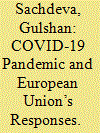

|
|
|
|
|
| Summary/Abstract |
In the last few months, Covid-19 pandemic has changed the world dramatically. Millions of people have been infected by the virus and hundreds of thousands have died. As situation is unfolding, we are still perhaps at the early stage of pandemic. Since the beginning of April 2020, about 75,000 infections were reported every day in the world. Now the figure is crossing almost 100,000 every day.
|
|
|
|
|
|
|
|
|
|
|
|
|
|
|
|
| 15 |
ID:
192596
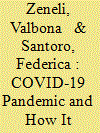

|
|
|
|
|
| Summary/Abstract |
Italy was the most affected European country at the beginning of the COVID-19 pandemic. While the European Union was struggling to get its act together and provide assistance to an ally in need, Russia and China used the opportunity to promote their own agendas. The focus of this article is on the economic and social impact of the COVID-19 pandemic on Italy, China’s disinformation campaign, and the uncertain future of the relations between the two countries.
|
|
|
|
|
|
|
|
|
|
|
|
|
|
|
|
| 16 |
ID:
173560
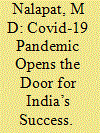

|
|
|
|
|
| Summary/Abstract |
Missing a target by an inch is the same as missing it by ten feet. Throughout its seven-plus decades as an admittedly truncated by free country, India has often found itself in a situation where It falls just a bit short of the level needed to ensure substantial advantage. In most of the groupings that the country has participated in, seldom has it had its own way over the objections of those powers seeking to constrain its rise.
|
|
|
|
|
|
|
|
|
|
|
|
|
|
|
|
| 17 |
ID:
192061
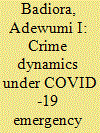

|
|
|
|
|
| Summary/Abstract |
This study examines how the COVID-19 emergency has impacted crime across different locations in Nigeria. Data were collected from a sample of residents from across Nigeria and analysed using mean ratings, percentages and chi-square. Based on the residents’ perceptions, certain crime types have decreased (e.g. home break-ins and assaults), some remain unchanged (e.g. stealing and pilfering) and others have increased (e.g. cybercrime and domestic violence). The findings show concentrations of crime in urban centres, states on total lockdown and geographical areas with poor economic indicators. The times that most crimes are perpetrated remain unchanged, except for the night time, where there has been a significant increase. Generally, individual responses to crime remain unchanged, although the use of security guards and special security door locks has changed significantly. Conversely, neighbourhood-level responses have changed significantly, particularly with the use of vigilante groups, police and military patrols as well as restrictions of human and vehicular movement. Although some of the causes of this crime change existed before COVID-19, new crime opportunities are also acknowledged. The findings suggest that Nigerian cities may face a severe battle to recover from crime even after the COVID-19 emergency has passed. Policy and further research implications are discussed.
|
|
|
|
|
|
|
|
|
|
|
|
|
|
|
|
| 18 |
ID:
189471
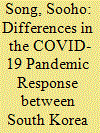

|
|
|
|
|
| Summary/Abstract |
The impact of the COVID-19 pandemic has varied across countries. Some countries controlled the virus relatively well, while others did not. In the United States, almost a million people died. However, South Korea’s death toll is only about 12,000 even though its population is about one-sixth of the United States. What caused the difference? We argue that public compliance to government direction is the primary reason. South Korea’s collective culture valuing communal benefits helped the people conform to government directions, such as mask wearing in public places. By contrast, American people resisted the government policies that restrict individual freedom due to the individualistic culture. In South Korea, historical experiences of relatively frequent national crises led to the rise of defensive nationalism, resulting in national union. However, the United States had relatively fewer national crises, and thus nationalism did not rise. Instead, national division, xenophobia, and hatred toward Asians prevailed in the United States. Besides the cultural differences, differences in national leader’s characteristics, past experiences of public health crisis, and political system also contributed to the different outcomes of the crisis.
|
|
|
|
|
|
|
|
|
|
|
|
|
|
|
|
| 19 |
ID:
177653
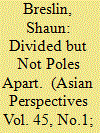

|
|
|
|
|
| Summary/Abstract |
While differences remain, the gap between US and European debates over the likely impact of China’s rise on the
global order has narrowed in recent years. At the same time,
China’s leaders have been more confident in establishing
dichotomized distinctions between their view of how the
world should be ordered and how China will act as a great
power on one hand, and what they depict as the West’s preferences and the typical modus operandi of Western powers
on the other. Despite evidence of ever clearer dividing lines
between different visions of China’s impact on the future of
the global order, this is not the same as a return to bipolarity. The problems of disentangling transnational economic
relations, different levels of followership for potential leaders, and pragmatic considerations of governance efficacy in
diverse issue areas all suggest something other than fixed
bloc-type alliances on either side of a bipolar divide.
|
|
|
|
|
|
|
|
|
|
|
|
|
|
|
|
| 20 |
ID:
174876
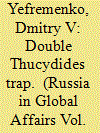

|
|
|
|
|
| Summary/Abstract |
Donald Trump’s presidency steered U.S.-China relations into a phase of open rivalry for global domination. The U.S. has failed to sidestep the risk of confrontation with China that Graham Allison warned of with his “Thucydides trap” metaphor. The two countries’ strongest trading and economic interdependence has proven unable to prevent a political standoff between Washington and Beijing. Their competition in science and engineering may result in the emergence of two technoeconomic platforms other countries will have to choose between. At the same time, the new U.S.-Chinese bipolarity is far more complex and internally controversial, which is a reason enough to postulate the existence of a “double Thucydides trap.” Importantly, global development is being greatly influenced by the interaction within the U.S.-China-Russia triangle.
|
|
|
|
|
|
|
|
|
|
|
|
|
|
|
|
|
|
|
|
|